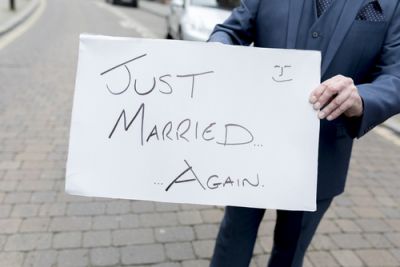 At your wedding, friends and family witnessed you and your spouse make important promises to each other. You may have also seen your parents, relatives, or long-married associates renew their vows. Understanding these events and the reasons behind them can help you assess what’s best for you and your partner and plan a meaningful vow renewal ceremony.
At your wedding, friends and family witnessed you and your spouse make important promises to each other. You may have also seen your parents, relatives, or long-married associates renew their vows. Understanding these events and the reasons behind them can help you assess what’s best for you and your partner and plan a meaningful vow renewal ceremony.
Why Couples Renew Their Vows
Wedding Wire’s Jen Sinrich outlines some common reasons why couples plan renewal ceremonies. Some do so to commemorate the lives they’ve forged together, including the successes and growth they’ve achieved. Others renew their vows after experiencing a period of struggles, such as illness or financial hardships. Depending on your goals, your ceremony can celebrate your past, present, future, or all three.
When Should You Host a Renewal Ceremony?
As Martha Stewart Weddings points out, some couples make vow renewals an annual tradition. Others opt for milestones such as a 10th or 20th wedding anniversary. Yet you don’t necessarily have to wait for a milestone anniversary to host your event. Whatever you decide, you should have clear reasons for hosting a vow renewal.
Pay Attention to These Essentials
You’ll need to remember some important details while pulling together your vow renewal. Wedding Wire’s Jenn Sinrich stresses that your ceremony is a commemoration and will not be legally binding. Based on the original vows you took and the legal requirements you followed for your original wedding, your marriage is already valid.
At the same time, you have several options when it comes to your vows. The Spruce’s Nina Callaway reminds readers that they’ll likely sound a little different than the ones you originally used. You and your spouse can collaborate and write your own or look to Callaway’s suggested wording samples for inspiration.
For your ceremony, Sinrich also advises hiring an officiant. You could choose the person who performed your wedding as a nice touch. However, it’s also an opportunity to select a different individual who understands both your values and your purpose for the ceremony. This person may request to see your marriage license, but that’s only to confirm that you’re actually married. Just as you did when arranging your wedding, work with the officiant when it comes to vows, ceremony program order, and other important details.
Other Ceremony Planning Tips
While a vow renewal ceremony is a different animal than a wedding, some similar planning tips can help organize a meaningful event. First, you’ll need to consider your guest count. Callaway mentions that most renewals tend to be small and intimate, with a close circle of loved ones to help the couple celebrate. Yet Sinrich reveals that others use it as a chance to throw a big bash. A larger affair can work well, especially if you’re holding your ceremony during a milestone anniversary.
Callaway also stresses a few more important etiquette points to keep in mind as you plan. Remember that you don’t need to select attendants for a vow renewal. Also, you won’t register for gifts or throw any showers or parties. Finally, your invitations’ wording will vary according to who’s hosting your affair. Just as with a standard wedding, the hosts should be mentioned first. Callaway shows a couple of wording examples that you can adopt or modify to suit your own needs.
Love, Marriage, and Continued Commitment
Renewing your vows can be a wonderful way of reasserting your commitment to each other and allowing your inner circle to celebrate with you. A renewal ceremony usually isn’t as lavish as a wedding, but it’s significant nonetheless. As with planning any social event, an organized approach and carefully selected details will help make yours a success.
Add Your Comment